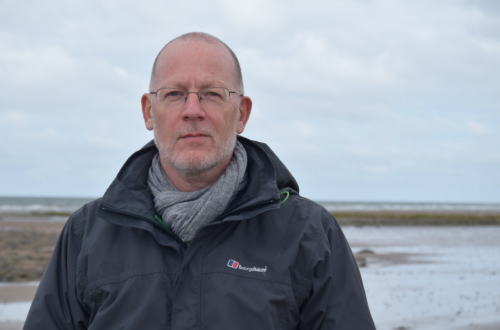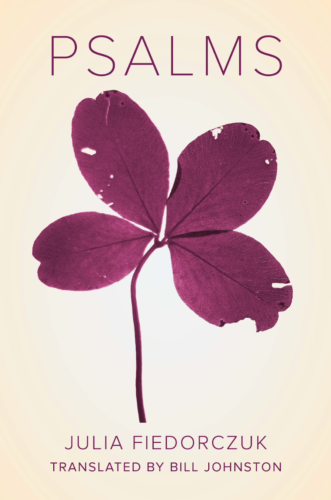in what language should I speak to you, sunso you’ll rise tomorrow for my child, so you’llrise and stimulate the growth of our food, circulation,how should I sing it for my childhow should I sing to you, planet, so you’ll forgive mefor giving birth to appetite, for giving birth to a questionhooked onto nothing, how can I winthe generosity of the creator-bacteriahow can I win clean rain air glucose la laso we’ll lie down and fall asleep, so we’ll wake upso we’ll lie down and fall asleep, so we’ll wake up,gravitation: tfi lalaso you’ll lie us down and fall us asleep, and wake us— Psalm IIIw jakim języku mam do ciebie mówić, słońceżebyś jutro wstało dla mojego dziecka żebyśwstało i pobudziło tkanki pokarmów krążeniejak mam to zaśpiewać dla mojego dzieckajak mam tobie śpiewać planeto żebyś wybaczyłaże urodziłam głód, że urodziłam pytaniezaczepione o nic, jak sobie zaskarbićszczodrobliwość stworzycielek-bakteriiczysty deszcz powietrze glukozę la laże ułożymy się i zaśniemy, że się obudzimyże ułożymy się i zaśniemy, że się obudzimygrawitacjo: tfi la laże nas ułożysz i zaśniesz, i że nas obudzisz—
Psalm III
Feature Date
- January 30, 2024
Series
- Translation
Selected By
Share This Poem
Print This Poem
“Psalm III” from PSALMS: by Julia Fiedorczuk
Translated by Bill Johnston
Published by University of Wisconsin Press in October, 2023.
Copyright © 2023 by Bill Johnston.
All rights reserved.
Reproduced by Poetry Daily with permission.
Originally published in Interdisciplinary Studies in Literature and Environment.
Julia Fiedorczuk is one of Poland’s leading poets. She was awarded the 2018 Szymborska Prize, Poland’s most prestigious poetry award, for Psalmy (Psalms), and has received many other honors, including the Hubert Burda Prize and the Polish Association of Book Publishers award for best debut. She has published six volumes of poetry, two novels, a collection of short stories, and three critical books. She is a professor of American studies at Warsaw University. Her work, both creative and academic, focuses on the relationship between humans and their more-than-human environments. Her poems have been translated into many languages, including Swedish, Spanish, Ukrainian, Serbian, and English. A collection of her poetry titled Oxygen, in Bill Johnston’s translation, was published by Zephyr Books in 2017. Fiedorczuk has translated the poetry of numerous American poets, including Wallace Stevens, Laura Riding, and Forrest Gander.

Bill Johnston is a literary translator working from Polish and French. His translation of Julia Fiedorczuk’s 2017 poetry book Psalms was runner up for the inaugural Wisconsin Prize for Poetry in Translation, and was published in November 2023 by the University of Wisconsin Press. His other awards include the PEN Translation Prize, the Best Translated Book Award (with Wiesław Myśliwski), and the National Translation Award in Poetry. He teaches literary translation at Indiana University.
“Fiedorczuk is, deservingly, an international literary star who writes distinctively across genres. In this innovative, formally restless collection, the divine and bacterial, children and rivers, war and eros mix—kaleidoscopically—in unsettling poems that serve as hymns to the sacrality of life—all life, even the life of rocks. Somehow, I don’t know how, Johnston’s translation catches the music, the vowel rhyme, the staggered, restless phrasings of the originals, and Fiedorczuk’s poignant, broken tones of supplication and gratitude.”
—Forrest Gander, judge of the Wisconsin Prize for Poetry in Translation and author of Twice Alive
Poetry Daily Depends on You
With your support, we make reading the best contemporary poetry a treasured daily experience. Consider a contribution today.




